Case Study: Le v Minister for Immigration [2019] - Migration Law 6
VerifiedAdded on 2022/08/12
|9
|2037
|39
Case Study
AI Summary
This case study examines the case of Le v. Minister for Immigration [2019] FCCA 2167, focusing on the application of migration law in Australia. The case involves Miss Le's attempt to obtain a partner visa despite having condition 8503 imposed on her visa, which typically prevents further visa applications. The assignment analyzes the legal arguments, the decision of the Federal Circuit Court of Australia, and the application of relevant sections of the Migration Act 1958 and Migration Regulations 1994. It addresses the validity of the visa application under section 46(1A) of the Migration Act, the refusal to waive condition 8503, and the delegate's decision based on subregulation 2.05(4) of the Migration Regulation. The case study explores the circumstances under which condition 8503 is imposed, the requirements for waiving the condition, and the potential for judicial review. The document also includes references to relevant legislation, cases, and websites to support the analysis.

[Case study]
2020
University
Student Credentials
2020
University
Student Credentials
Paraphrase This Document
Need a fresh take? Get an instant paraphrase of this document with our AI Paraphraser
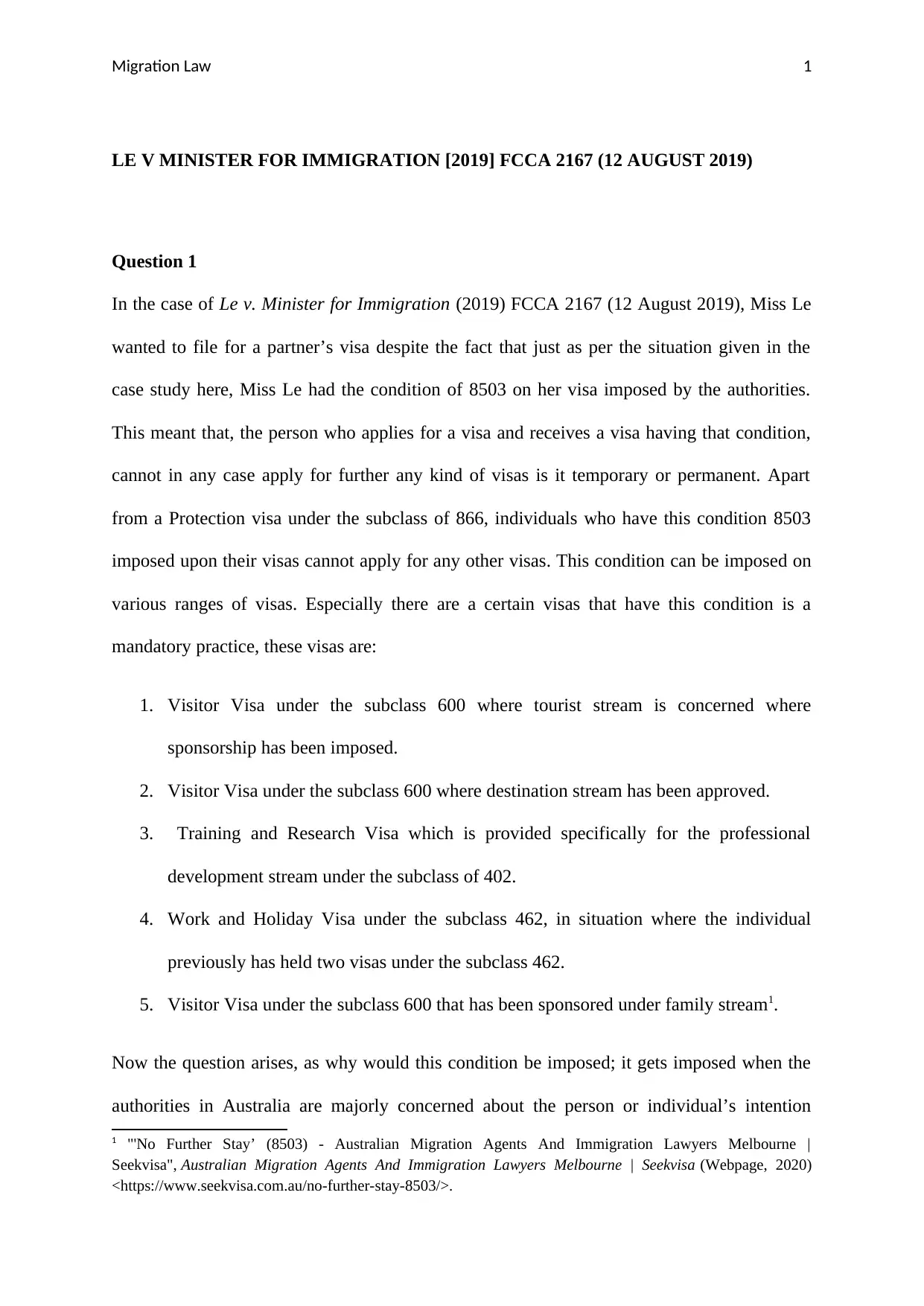
Migration Law 1
LE V MINISTER FOR IMMIGRATION [2019] FCCA 2167 (12 AUGUST 2019)
Question 1
In the case of Le v. Minister for Immigration (2019) FCCA 2167 (12 August 2019), Miss Le
wanted to file for a partner’s visa despite the fact that just as per the situation given in the
case study here, Miss Le had the condition of 8503 on her visa imposed by the authorities.
This meant that, the person who applies for a visa and receives a visa having that condition,
cannot in any case apply for further any kind of visas is it temporary or permanent. Apart
from a Protection visa under the subclass of 866, individuals who have this condition 8503
imposed upon their visas cannot apply for any other visas. This condition can be imposed on
various ranges of visas. Especially there are a certain visas that have this condition is a
mandatory practice, these visas are:
1. Visitor Visa under the subclass 600 where tourist stream is concerned where
sponsorship has been imposed.
2. Visitor Visa under the subclass 600 where destination stream has been approved.
3. Training and Research Visa which is provided specifically for the professional
development stream under the subclass of 402.
4. Work and Holiday Visa under the subclass 462, in situation where the individual
previously has held two visas under the subclass 462.
5. Visitor Visa under the subclass 600 that has been sponsored under family stream1.
Now the question arises, as why would this condition be imposed; it gets imposed when the
authorities in Australia are majorly concerned about the person or individual’s intention
1 "'No Further Stay’ (8503) - Australian Migration Agents And Immigration Lawyers Melbourne |
Seekvisa", Australian Migration Agents And Immigration Lawyers Melbourne | Seekvisa (Webpage, 2020)
<https://www.seekvisa.com.au/no-further-stay-8503/>.
LE V MINISTER FOR IMMIGRATION [2019] FCCA 2167 (12 AUGUST 2019)
Question 1
In the case of Le v. Minister for Immigration (2019) FCCA 2167 (12 August 2019), Miss Le
wanted to file for a partner’s visa despite the fact that just as per the situation given in the
case study here, Miss Le had the condition of 8503 on her visa imposed by the authorities.
This meant that, the person who applies for a visa and receives a visa having that condition,
cannot in any case apply for further any kind of visas is it temporary or permanent. Apart
from a Protection visa under the subclass of 866, individuals who have this condition 8503
imposed upon their visas cannot apply for any other visas. This condition can be imposed on
various ranges of visas. Especially there are a certain visas that have this condition is a
mandatory practice, these visas are:
1. Visitor Visa under the subclass 600 where tourist stream is concerned where
sponsorship has been imposed.
2. Visitor Visa under the subclass 600 where destination stream has been approved.
3. Training and Research Visa which is provided specifically for the professional
development stream under the subclass of 402.
4. Work and Holiday Visa under the subclass 462, in situation where the individual
previously has held two visas under the subclass 462.
5. Visitor Visa under the subclass 600 that has been sponsored under family stream1.
Now the question arises, as why would this condition be imposed; it gets imposed when the
authorities in Australia are majorly concerned about the person or individual’s intention
1 "'No Further Stay’ (8503) - Australian Migration Agents And Immigration Lawyers Melbourne |
Seekvisa", Australian Migration Agents And Immigration Lawyers Melbourne | Seekvisa (Webpage, 2020)
<https://www.seekvisa.com.au/no-further-stay-8503/>.
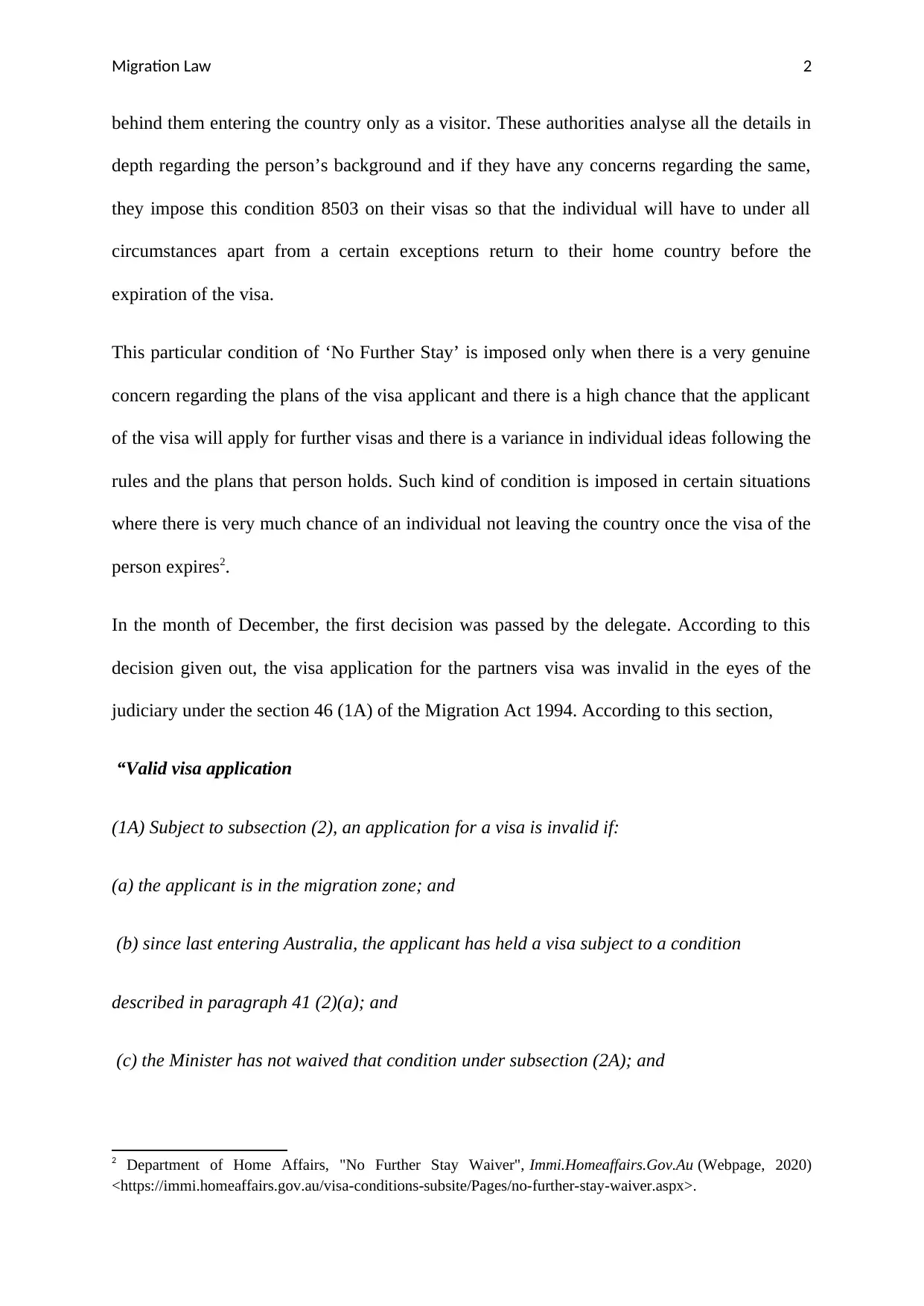
Migration Law 2
behind them entering the country only as a visitor. These authorities analyse all the details in
depth regarding the person’s background and if they have any concerns regarding the same,
they impose this condition 8503 on their visas so that the individual will have to under all
circumstances apart from a certain exceptions return to their home country before the
expiration of the visa.
This particular condition of ‘No Further Stay’ is imposed only when there is a very genuine
concern regarding the plans of the visa applicant and there is a high chance that the applicant
of the visa will apply for further visas and there is a variance in individual ideas following the
rules and the plans that person holds. Such kind of condition is imposed in certain situations
where there is very much chance of an individual not leaving the country once the visa of the
person expires2.
In the month of December, the first decision was passed by the delegate. According to this
decision given out, the visa application for the partners visa was invalid in the eyes of the
judiciary under the section 46 (1A) of the Migration Act 1994. According to this section,
“Valid visa application
(1A) Subject to subsection (2), an application for a visa is invalid if:
(a) the applicant is in the migration zone; and
(b) since last entering Australia, the applicant has held a visa subject to a condition
described in paragraph 41 (2)(a); and
(c) the Minister has not waived that condition under subsection (2A); and
2 Department of Home Affairs, "No Further Stay Waiver", Immi.Homeaffairs.Gov.Au (Webpage, 2020)
<https://immi.homeaffairs.gov.au/visa-conditions-subsite/Pages/no-further-stay-waiver.aspx>.
behind them entering the country only as a visitor. These authorities analyse all the details in
depth regarding the person’s background and if they have any concerns regarding the same,
they impose this condition 8503 on their visas so that the individual will have to under all
circumstances apart from a certain exceptions return to their home country before the
expiration of the visa.
This particular condition of ‘No Further Stay’ is imposed only when there is a very genuine
concern regarding the plans of the visa applicant and there is a high chance that the applicant
of the visa will apply for further visas and there is a variance in individual ideas following the
rules and the plans that person holds. Such kind of condition is imposed in certain situations
where there is very much chance of an individual not leaving the country once the visa of the
person expires2.
In the month of December, the first decision was passed by the delegate. According to this
decision given out, the visa application for the partners visa was invalid in the eyes of the
judiciary under the section 46 (1A) of the Migration Act 1994. According to this section,
“Valid visa application
(1A) Subject to subsection (2), an application for a visa is invalid if:
(a) the applicant is in the migration zone; and
(b) since last entering Australia, the applicant has held a visa subject to a condition
described in paragraph 41 (2)(a); and
(c) the Minister has not waived that condition under subsection (2A); and
2 Department of Home Affairs, "No Further Stay Waiver", Immi.Homeaffairs.Gov.Au (Webpage, 2020)
<https://immi.homeaffairs.gov.au/visa-conditions-subsite/Pages/no-further-stay-waiver.aspx>.
⊘ This is a preview!⊘
Do you want full access?
Subscribe today to unlock all pages.

Trusted by 1+ million students worldwide
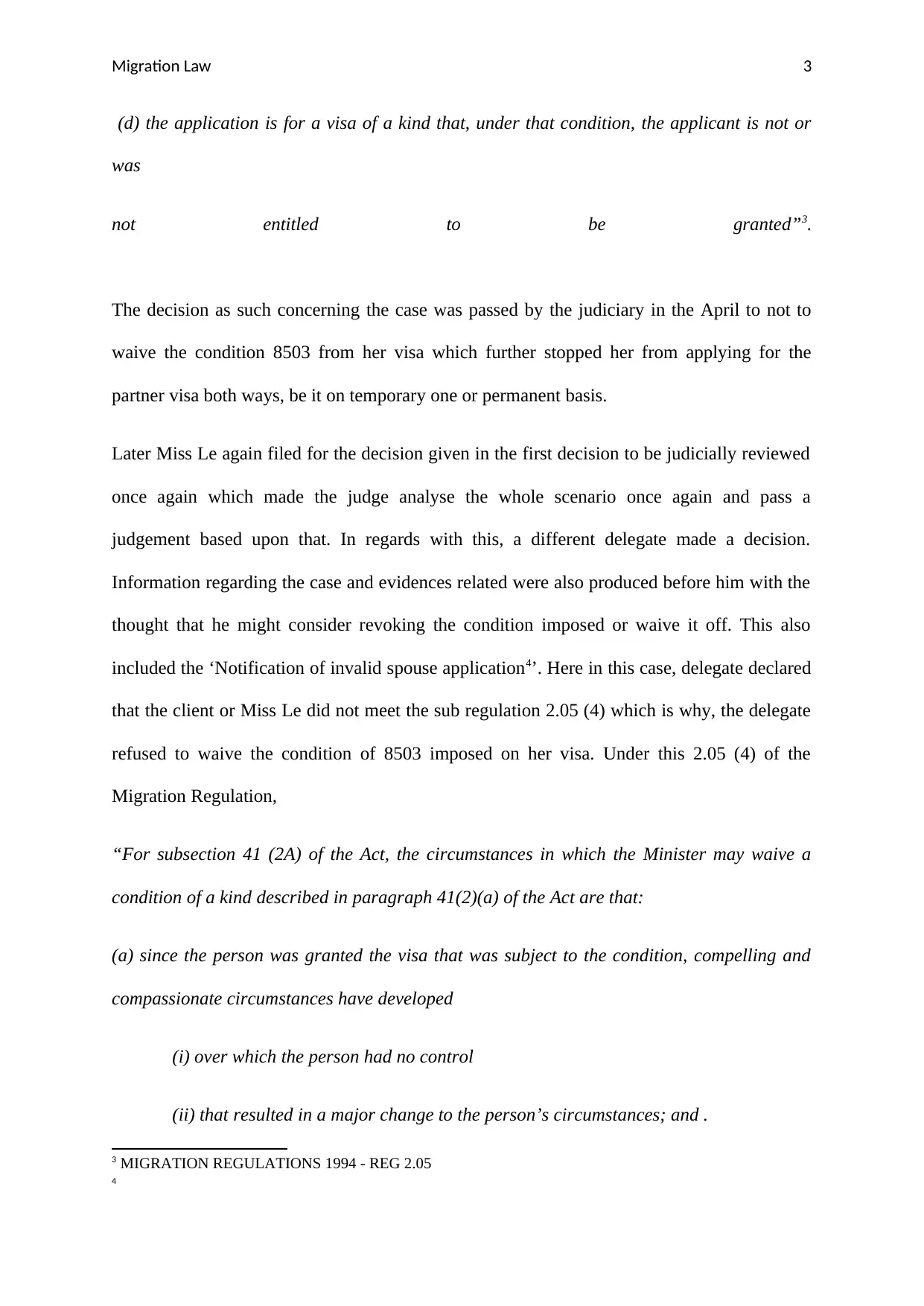
Migration Law 3
(d) the application is for a visa of a kind that, under that condition, the applicant is not or
was
not entitled to be granted”3.
The decision as such concerning the case was passed by the judiciary in the April to not to
waive the condition 8503 from her visa which further stopped her from applying for the
partner visa both ways, be it on temporary one or permanent basis.
Later Miss Le again filed for the decision given in the first decision to be judicially reviewed
once again which made the judge analyse the whole scenario once again and pass a
judgement based upon that. In regards with this, a different delegate made a decision.
Information regarding the case and evidences related were also produced before him with the
thought that he might consider revoking the condition imposed or waive it off. This also
included the ‘Notification of invalid spouse application4’. Here in this case, delegate declared
that the client or Miss Le did not meet the sub regulation 2.05 (4) which is why, the delegate
refused to waive the condition of 8503 imposed on her visa. Under this 2.05 (4) of the
Migration Regulation,
“For subsection 41 (2A) of the Act, the circumstances in which the Minister may waive a
condition of a kind described in paragraph 41(2)(a) of the Act are that:
(a) since the person was granted the visa that was subject to the condition, compelling and
compassionate circumstances have developed
(i) over which the person had no control
(ii) that resulted in a major change to the person’s circumstances; and .
3 MIGRATION REGULATIONS 1994 - REG 2.05
4
(d) the application is for a visa of a kind that, under that condition, the applicant is not or
was
not entitled to be granted”3.
The decision as such concerning the case was passed by the judiciary in the April to not to
waive the condition 8503 from her visa which further stopped her from applying for the
partner visa both ways, be it on temporary one or permanent basis.
Later Miss Le again filed for the decision given in the first decision to be judicially reviewed
once again which made the judge analyse the whole scenario once again and pass a
judgement based upon that. In regards with this, a different delegate made a decision.
Information regarding the case and evidences related were also produced before him with the
thought that he might consider revoking the condition imposed or waive it off. This also
included the ‘Notification of invalid spouse application4’. Here in this case, delegate declared
that the client or Miss Le did not meet the sub regulation 2.05 (4) which is why, the delegate
refused to waive the condition of 8503 imposed on her visa. Under this 2.05 (4) of the
Migration Regulation,
“For subsection 41 (2A) of the Act, the circumstances in which the Minister may waive a
condition of a kind described in paragraph 41(2)(a) of the Act are that:
(a) since the person was granted the visa that was subject to the condition, compelling and
compassionate circumstances have developed
(i) over which the person had no control
(ii) that resulted in a major change to the person’s circumstances; and .
3 MIGRATION REGULATIONS 1994 - REG 2.05
4
Paraphrase This Document
Need a fresh take? Get an instant paraphrase of this document with our AI Paraphraser
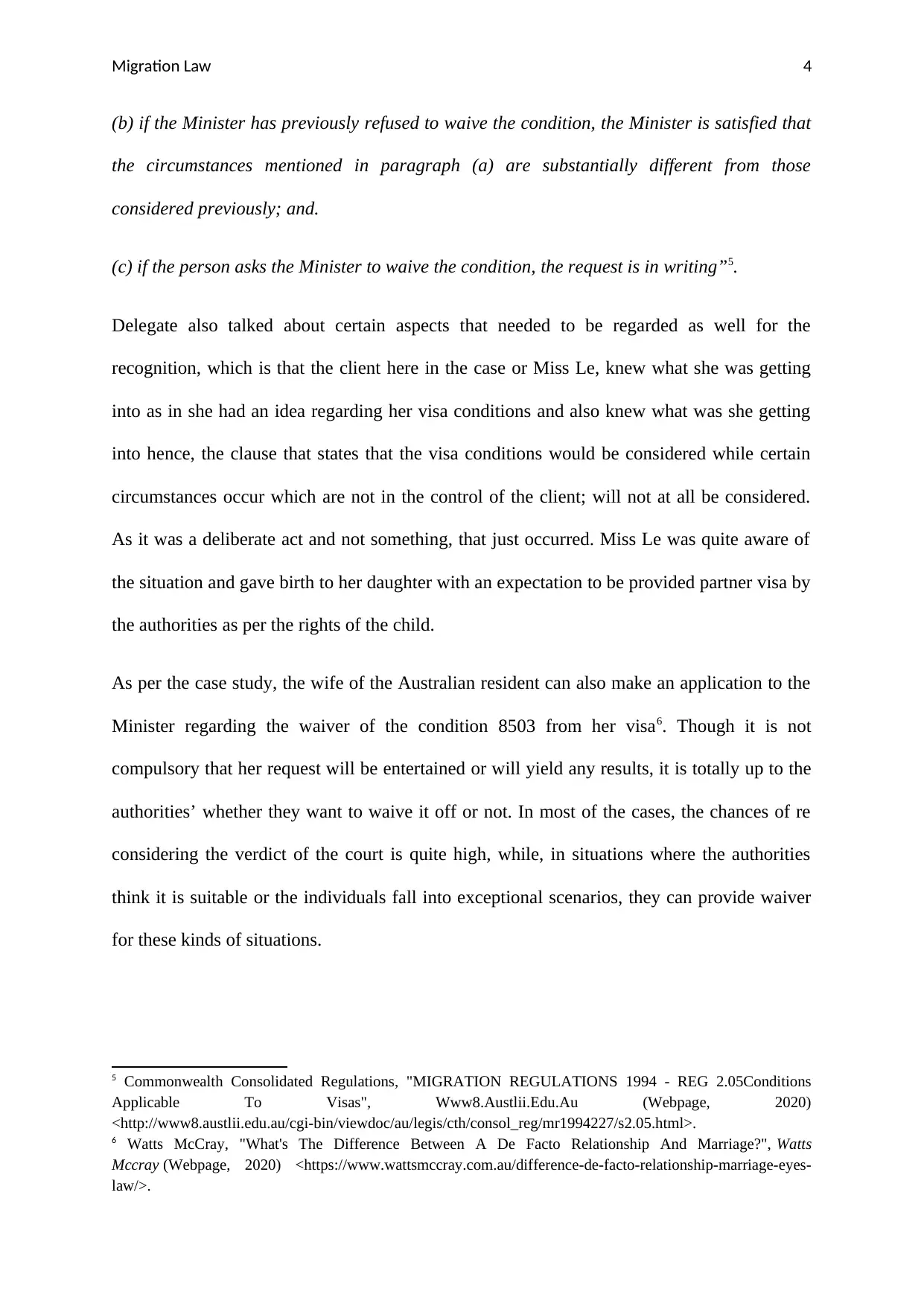
Migration Law 4
(b) if the Minister has previously refused to waive the condition, the Minister is satisfied that
the circumstances mentioned in paragraph (a) are substantially different from those
considered previously; and.
(c) if the person asks the Minister to waive the condition, the request is in writing”5.
Delegate also talked about certain aspects that needed to be regarded as well for the
recognition, which is that the client here in the case or Miss Le, knew what she was getting
into as in she had an idea regarding her visa conditions and also knew what was she getting
into hence, the clause that states that the visa conditions would be considered while certain
circumstances occur which are not in the control of the client; will not at all be considered.
As it was a deliberate act and not something, that just occurred. Miss Le was quite aware of
the situation and gave birth to her daughter with an expectation to be provided partner visa by
the authorities as per the rights of the child.
As per the case study, the wife of the Australian resident can also make an application to the
Minister regarding the waiver of the condition 8503 from her visa6. Though it is not
compulsory that her request will be entertained or will yield any results, it is totally up to the
authorities’ whether they want to waive it off or not. In most of the cases, the chances of re
considering the verdict of the court is quite high, while, in situations where the authorities
think it is suitable or the individuals fall into exceptional scenarios, they can provide waiver
for these kinds of situations.
5 Commonwealth Consolidated Regulations, "MIGRATION REGULATIONS 1994 - REG 2.05Conditions
Applicable To Visas", Www8.Austlii.Edu.Au (Webpage, 2020)
<http://www8.austlii.edu.au/cgi-bin/viewdoc/au/legis/cth/consol_reg/mr1994227/s2.05.html>.
6 Watts McCray, "What's The Difference Between A De Facto Relationship And Marriage?", Watts
Mccray (Webpage, 2020) <https://www.wattsmccray.com.au/difference-de-facto-relationship-marriage-eyes-
law/>.
(b) if the Minister has previously refused to waive the condition, the Minister is satisfied that
the circumstances mentioned in paragraph (a) are substantially different from those
considered previously; and.
(c) if the person asks the Minister to waive the condition, the request is in writing”5.
Delegate also talked about certain aspects that needed to be regarded as well for the
recognition, which is that the client here in the case or Miss Le, knew what she was getting
into as in she had an idea regarding her visa conditions and also knew what was she getting
into hence, the clause that states that the visa conditions would be considered while certain
circumstances occur which are not in the control of the client; will not at all be considered.
As it was a deliberate act and not something, that just occurred. Miss Le was quite aware of
the situation and gave birth to her daughter with an expectation to be provided partner visa by
the authorities as per the rights of the child.
As per the case study, the wife of the Australian resident can also make an application to the
Minister regarding the waiver of the condition 8503 from her visa6. Though it is not
compulsory that her request will be entertained or will yield any results, it is totally up to the
authorities’ whether they want to waive it off or not. In most of the cases, the chances of re
considering the verdict of the court is quite high, while, in situations where the authorities
think it is suitable or the individuals fall into exceptional scenarios, they can provide waiver
for these kinds of situations.
5 Commonwealth Consolidated Regulations, "MIGRATION REGULATIONS 1994 - REG 2.05Conditions
Applicable To Visas", Www8.Austlii.Edu.Au (Webpage, 2020)
<http://www8.austlii.edu.au/cgi-bin/viewdoc/au/legis/cth/consol_reg/mr1994227/s2.05.html>.
6 Watts McCray, "What's The Difference Between A De Facto Relationship And Marriage?", Watts
Mccray (Webpage, 2020) <https://www.wattsmccray.com.au/difference-de-facto-relationship-marriage-eyes-
law/>.
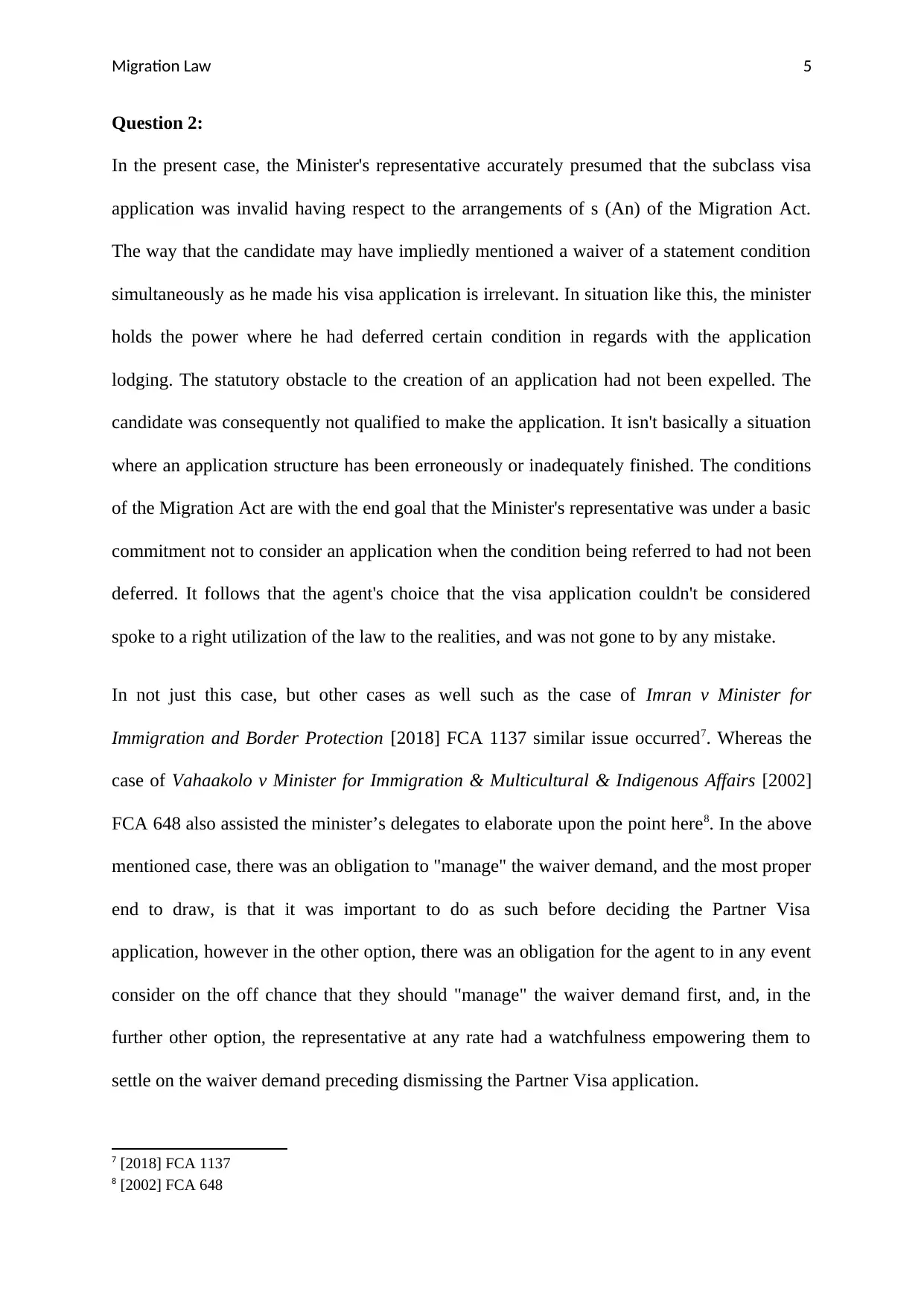
Migration Law 5
Question 2:
In the present case, the Minister's representative accurately presumed that the subclass visa
application was invalid having respect to the arrangements of s (An) of the Migration Act.
The way that the candidate may have impliedly mentioned a waiver of a statement condition
simultaneously as he made his visa application is irrelevant. In situation like this, the minister
holds the power where he had deferred certain condition in regards with the application
lodging. The statutory obstacle to the creation of an application had not been expelled. The
candidate was consequently not qualified to make the application. It isn't basically a situation
where an application structure has been erroneously or inadequately finished. The conditions
of the Migration Act are with the end goal that the Minister's representative was under a basic
commitment not to consider an application when the condition being referred to had not been
deferred. It follows that the agent's choice that the visa application couldn't be considered
spoke to a right utilization of the law to the realities, and was not gone to by any mistake.
In not just this case, but other cases as well such as the case of Imran v Minister for
Immigration and Border Protection [2018] FCA 1137 similar issue occurred7. Whereas the
case of Vahaakolo v Minister for Immigration & Multicultural & Indigenous Affairs [2002]
FCA 648 also assisted the minister’s delegates to elaborate upon the point here8. In the above
mentioned case, there was an obligation to "manage" the waiver demand, and the most proper
end to draw, is that it was important to do as such before deciding the Partner Visa
application, however in the other option, there was an obligation for the agent to in any event
consider on the off chance that they should "manage" the waiver demand first, and, in the
further other option, the representative at any rate had a watchfulness empowering them to
settle on the waiver demand preceding dismissing the Partner Visa application.
7 [2018] FCA 1137
8 [2002] FCA 648
Question 2:
In the present case, the Minister's representative accurately presumed that the subclass visa
application was invalid having respect to the arrangements of s (An) of the Migration Act.
The way that the candidate may have impliedly mentioned a waiver of a statement condition
simultaneously as he made his visa application is irrelevant. In situation like this, the minister
holds the power where he had deferred certain condition in regards with the application
lodging. The statutory obstacle to the creation of an application had not been expelled. The
candidate was consequently not qualified to make the application. It isn't basically a situation
where an application structure has been erroneously or inadequately finished. The conditions
of the Migration Act are with the end goal that the Minister's representative was under a basic
commitment not to consider an application when the condition being referred to had not been
deferred. It follows that the agent's choice that the visa application couldn't be considered
spoke to a right utilization of the law to the realities, and was not gone to by any mistake.
In not just this case, but other cases as well such as the case of Imran v Minister for
Immigration and Border Protection [2018] FCA 1137 similar issue occurred7. Whereas the
case of Vahaakolo v Minister for Immigration & Multicultural & Indigenous Affairs [2002]
FCA 648 also assisted the minister’s delegates to elaborate upon the point here8. In the above
mentioned case, there was an obligation to "manage" the waiver demand, and the most proper
end to draw, is that it was important to do as such before deciding the Partner Visa
application, however in the other option, there was an obligation for the agent to in any event
consider on the off chance that they should "manage" the waiver demand first, and, in the
further other option, the representative at any rate had a watchfulness empowering them to
settle on the waiver demand preceding dismissing the Partner Visa application.
7 [2018] FCA 1137
8 [2002] FCA 648
⊘ This is a preview!⊘
Do you want full access?
Subscribe today to unlock all pages.

Trusted by 1+ million students worldwide
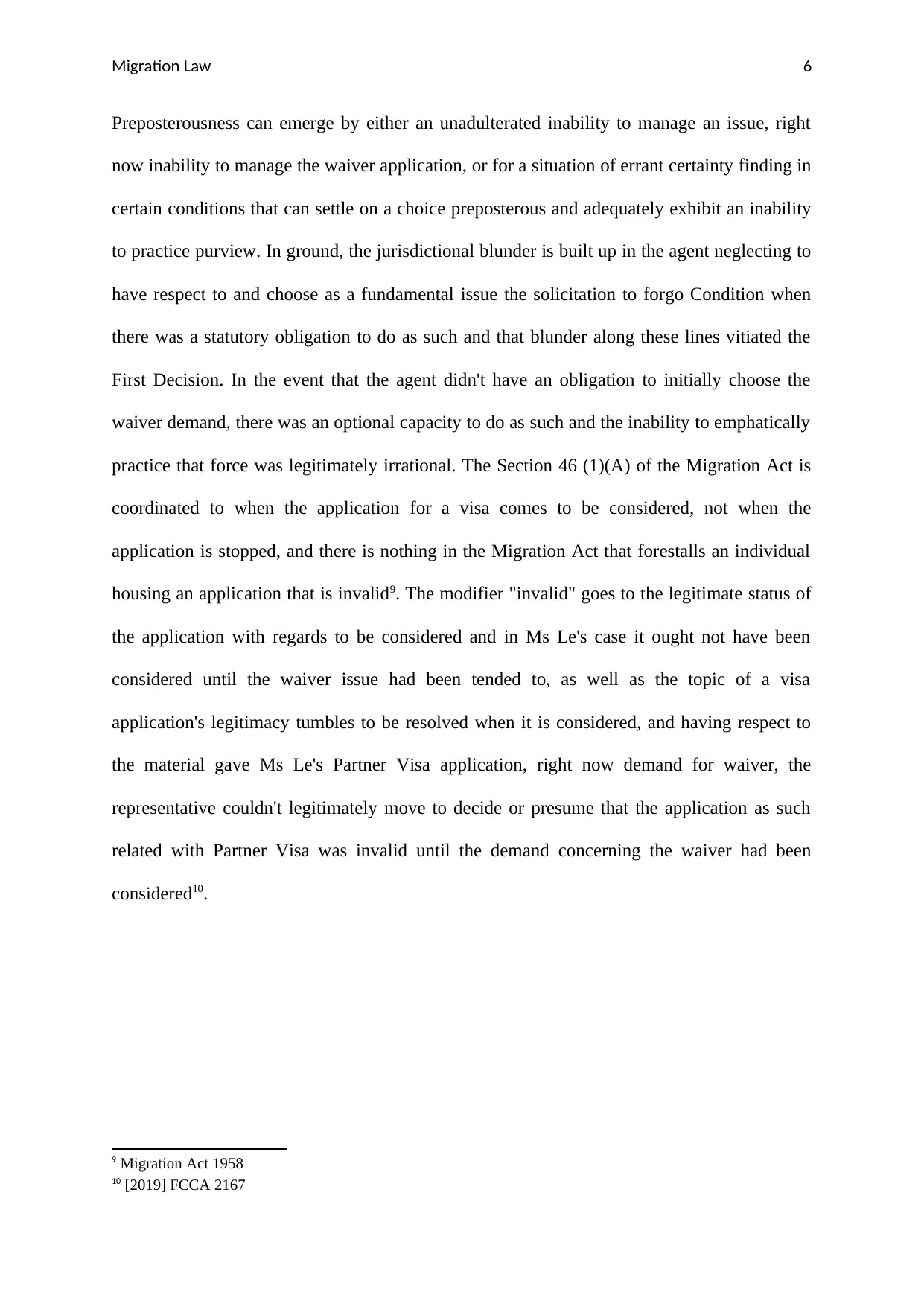
Migration Law 6
Preposterousness can emerge by either an unadulterated inability to manage an issue, right
now inability to manage the waiver application, or for a situation of errant certainty finding in
certain conditions that can settle on a choice preposterous and adequately exhibit an inability
to practice purview. In ground, the jurisdictional blunder is built up in the agent neglecting to
have respect to and choose as a fundamental issue the solicitation to forgo Condition when
there was a statutory obligation to do as such and that blunder along these lines vitiated the
First Decision. In the event that the agent didn't have an obligation to initially choose the
waiver demand, there was an optional capacity to do as such and the inability to emphatically
practice that force was legitimately irrational. The Section 46 (1)(A) of the Migration Act is
coordinated to when the application for a visa comes to be considered, not when the
application is stopped, and there is nothing in the Migration Act that forestalls an individual
housing an application that is invalid9. The modifier "invalid" goes to the legitimate status of
the application with regards to be considered and in Ms Le's case it ought not have been
considered until the waiver issue had been tended to, as well as the topic of a visa
application's legitimacy tumbles to be resolved when it is considered, and having respect to
the material gave Ms Le's Partner Visa application, right now demand for waiver, the
representative couldn't legitimately move to decide or presume that the application as such
related with Partner Visa was invalid until the demand concerning the waiver had been
considered10.
9 Migration Act 1958
10 [2019] FCCA 2167
Preposterousness can emerge by either an unadulterated inability to manage an issue, right
now inability to manage the waiver application, or for a situation of errant certainty finding in
certain conditions that can settle on a choice preposterous and adequately exhibit an inability
to practice purview. In ground, the jurisdictional blunder is built up in the agent neglecting to
have respect to and choose as a fundamental issue the solicitation to forgo Condition when
there was a statutory obligation to do as such and that blunder along these lines vitiated the
First Decision. In the event that the agent didn't have an obligation to initially choose the
waiver demand, there was an optional capacity to do as such and the inability to emphatically
practice that force was legitimately irrational. The Section 46 (1)(A) of the Migration Act is
coordinated to when the application for a visa comes to be considered, not when the
application is stopped, and there is nothing in the Migration Act that forestalls an individual
housing an application that is invalid9. The modifier "invalid" goes to the legitimate status of
the application with regards to be considered and in Ms Le's case it ought not have been
considered until the waiver issue had been tended to, as well as the topic of a visa
application's legitimacy tumbles to be resolved when it is considered, and having respect to
the material gave Ms Le's Partner Visa application, right now demand for waiver, the
representative couldn't legitimately move to decide or presume that the application as such
related with Partner Visa was invalid until the demand concerning the waiver had been
considered10.
9 Migration Act 1958
10 [2019] FCCA 2167
Paraphrase This Document
Need a fresh take? Get an instant paraphrase of this document with our AI Paraphraser
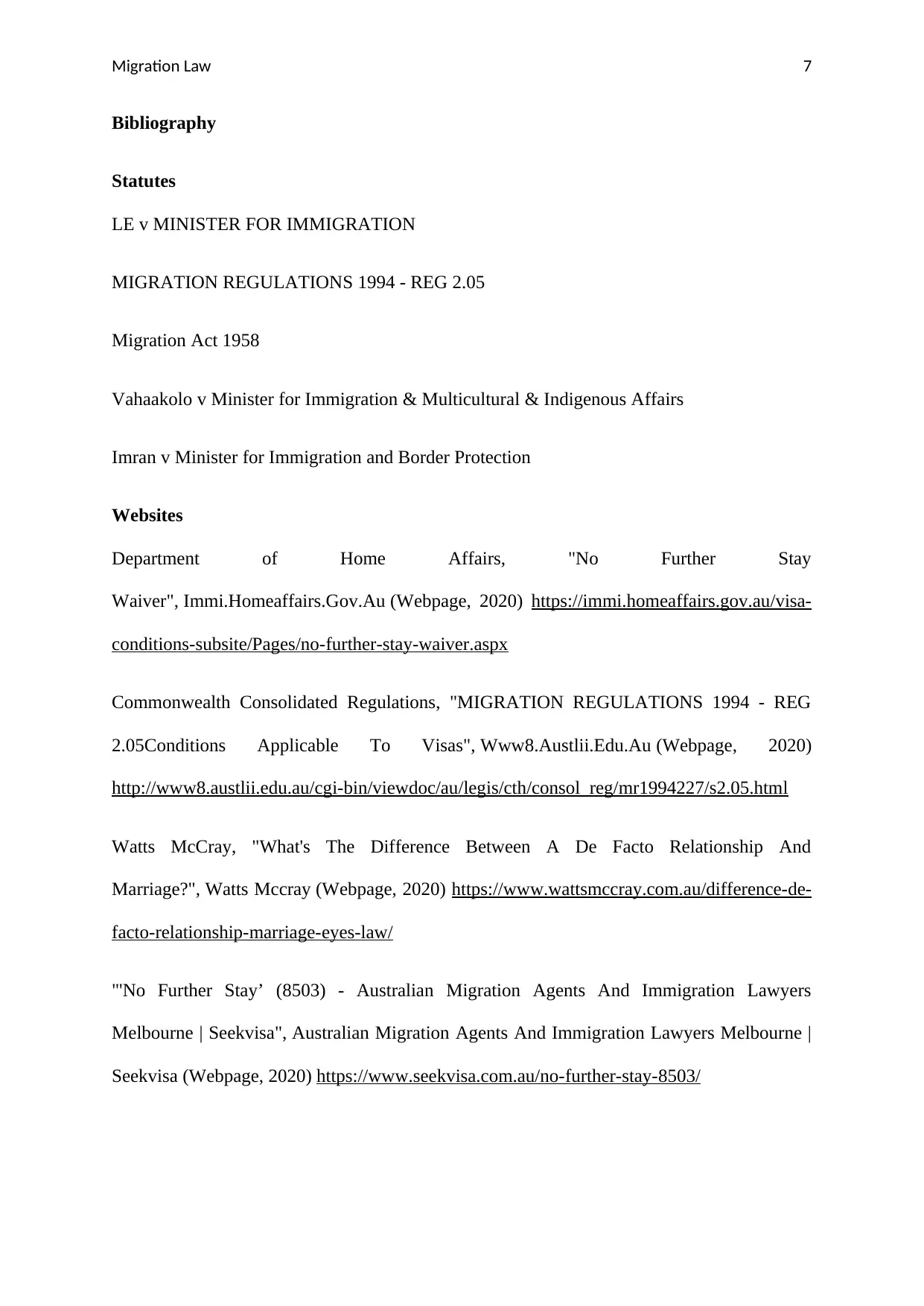
Migration Law 7
Bibliography
Statutes
LE v MINISTER FOR IMMIGRATION
MIGRATION REGULATIONS 1994 - REG 2.05
Migration Act 1958
Vahaakolo v Minister for Immigration & Multicultural & Indigenous Affairs
Imran v Minister for Immigration and Border Protection
Websites
Department of Home Affairs, "No Further Stay
Waiver", Immi.Homeaffairs.Gov.Au (Webpage, 2020) https://immi.homeaffairs.gov.au/visa-
conditions-subsite/Pages/no-further-stay-waiver.aspx
Commonwealth Consolidated Regulations, "MIGRATION REGULATIONS 1994 - REG
2.05Conditions Applicable To Visas", Www8.Austlii.Edu.Au (Webpage, 2020)
http://www8.austlii.edu.au/cgi-bin/viewdoc/au/legis/cth/consol_reg/mr1994227/s2.05.html
Watts McCray, "What's The Difference Between A De Facto Relationship And
Marriage?", Watts Mccray (Webpage, 2020) https://www.wattsmccray.com.au/difference-de-
facto-relationship-marriage-eyes-law/
"'No Further Stay’ (8503) - Australian Migration Agents And Immigration Lawyers
Melbourne | Seekvisa", Australian Migration Agents And Immigration Lawyers Melbourne |
Seekvisa (Webpage, 2020) https://www.seekvisa.com.au/no-further-stay-8503/
Bibliography
Statutes
LE v MINISTER FOR IMMIGRATION
MIGRATION REGULATIONS 1994 - REG 2.05
Migration Act 1958
Vahaakolo v Minister for Immigration & Multicultural & Indigenous Affairs
Imran v Minister for Immigration and Border Protection
Websites
Department of Home Affairs, "No Further Stay
Waiver", Immi.Homeaffairs.Gov.Au (Webpage, 2020) https://immi.homeaffairs.gov.au/visa-
conditions-subsite/Pages/no-further-stay-waiver.aspx
Commonwealth Consolidated Regulations, "MIGRATION REGULATIONS 1994 - REG
2.05Conditions Applicable To Visas", Www8.Austlii.Edu.Au (Webpage, 2020)
http://www8.austlii.edu.au/cgi-bin/viewdoc/au/legis/cth/consol_reg/mr1994227/s2.05.html
Watts McCray, "What's The Difference Between A De Facto Relationship And
Marriage?", Watts Mccray (Webpage, 2020) https://www.wattsmccray.com.au/difference-de-
facto-relationship-marriage-eyes-law/
"'No Further Stay’ (8503) - Australian Migration Agents And Immigration Lawyers
Melbourne | Seekvisa", Australian Migration Agents And Immigration Lawyers Melbourne |
Seekvisa (Webpage, 2020) https://www.seekvisa.com.au/no-further-stay-8503/

Migration Law 8
⊘ This is a preview!⊘
Do you want full access?
Subscribe today to unlock all pages.

Trusted by 1+ million students worldwide
1 out of 9
Related Documents
Your All-in-One AI-Powered Toolkit for Academic Success.
+13062052269
info@desklib.com
Available 24*7 on WhatsApp / Email
![[object Object]](/_next/static/media/star-bottom.7253800d.svg)
Unlock your academic potential
Copyright © 2020–2025 A2Z Services. All Rights Reserved. Developed and managed by ZUCOL.
![Analysis of the Migration Law Case: Le v Minister [2019]](/_next/image/?url=https%3A%2F%2Fdesklib.com%2Fmedia%2Fimages%2Frl%2F780402c184b2449aadc282a97825b399.jpg&w=256&q=75)
![Implications of Le v Minister for Immigration [2019] FCCA 2167](/_next/image/?url=https%3A%2F%2Fdesklib.com%2Fmedia%2Fimages%2Fyq%2F3867d1a1ba4b437ba61ecfd169b6d5a2.jpg&w=256&q=75)



